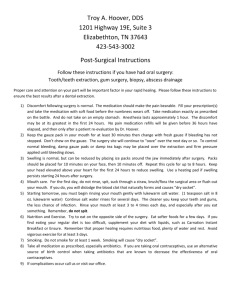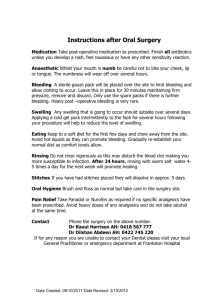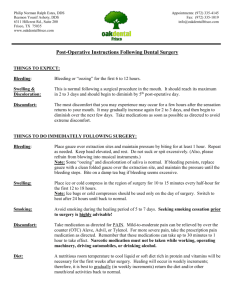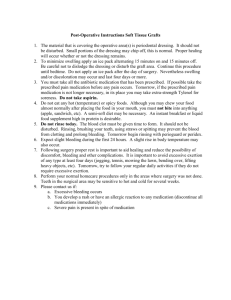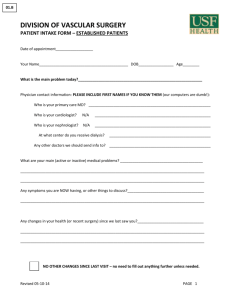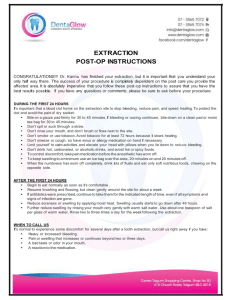Post Extraction Instructions
advertisement
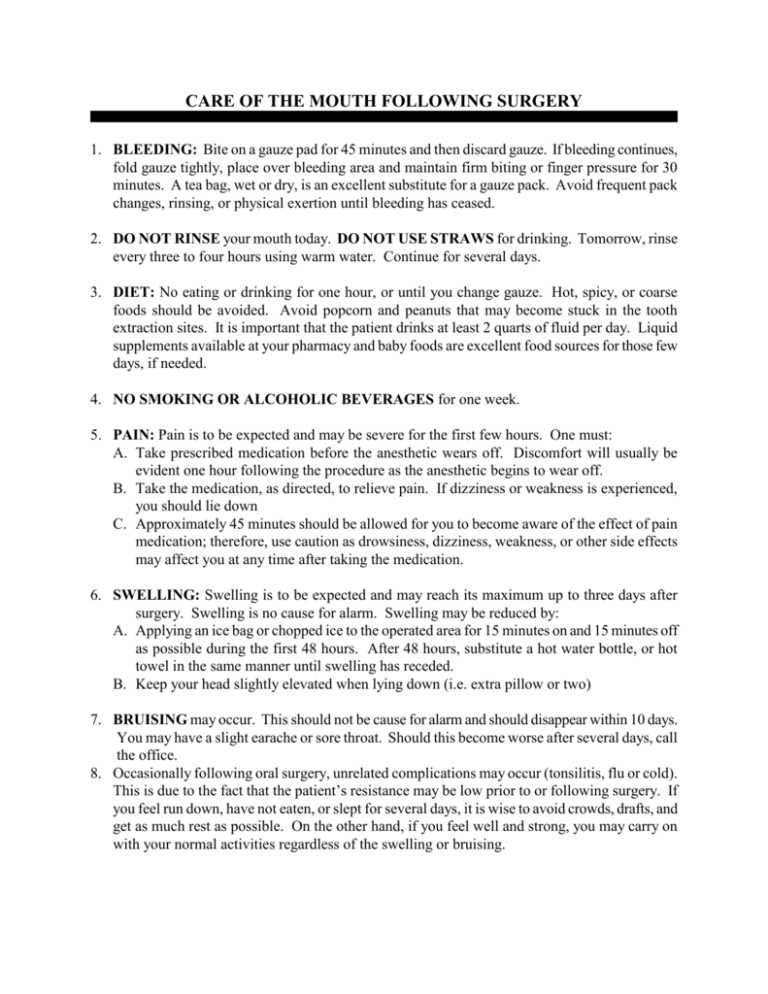
CARE OF THE MOUTH FOLLOWING SURGERY 1. BLEEDING: Bite on a gauze pad for 45 minutes and then discard gauze. If bleeding continues, fold gauze tightly, place over bleeding area and maintain firm biting or finger pressure for 30 minutes. A tea bag, wet or dry, is an excellent substitute for a gauze pack. Avoid frequent pack changes, rinsing, or physical exertion until bleeding has ceased. 2. DO NOT RINSE your mouth today. DO NOT USE STRAWS for drinking. Tomorrow, rinse every three to four hours using warm water. Continue for several days. 3. DIET: No eating or drinking for one hour, or until you change gauze. Hot, spicy, or coarse foods should be avoided. Avoid popcorn and peanuts that may become stuck in the tooth extraction sites. It is important that the patient drinks at least 2 quarts of fluid per day. Liquid supplements available at your pharmacy and baby foods are excellent food sources for those few days, if needed. 4. NO SMOKING OR ALCOHOLIC BEVERAGES for one week. 5. PAIN: Pain is to be expected and may be severe for the first few hours. One must: A. Take prescribed medication before the anesthetic wears off. Discomfort will usually be evident one hour following the procedure as the anesthetic begins to wear off. B. Take the medication, as directed, to relieve pain. If dizziness or weakness is experienced, you should lie down C. Approximately 45 minutes should be allowed for you to become aware of the effect of pain medication; therefore, use caution as drowsiness, dizziness, weakness, or other side effects may affect you at any time after taking the medication. 6. SWELLING: Swelling is to be expected and may reach its maximum up to three days after surgery. Swelling is no cause for alarm. Swelling may be reduced by: A. Applying an ice bag or chopped ice to the operated area for 15 minutes on and 15 minutes off as possible during the first 48 hours. After 48 hours, substitute a hot water bottle, or hot towel in the same manner until swelling has receded. B. Keep your head slightly elevated when lying down (i.e. extra pillow or two) 7. BRUISING may occur. This should not be cause for alarm and should disappear within 10 days. You may have a slight earache or sore throat. Should this become worse after several days, call the office. 8. Occasionally following oral surgery, unrelated complications may occur (tonsilitis, flu or cold). This is due to the fact that the patient’s resistance may be low prior to or following surgery. If you feel run down, have not eaten, or slept for several days, it is wise to avoid crowds, drafts, and get as much rest as possible. On the other hand, if you feel well and strong, you may carry on with your normal activities regardless of the swelling or bruising. 9. Nausea rarely occurs and may be avoided by taking pain medication with a glass of milk. If nausea is severe, stop taking the prescribed medication and switch to an acetaminophen based (Tylenol) medication. If pain is severe, call the office. 10. Antibiotics (Penicillin, etc.): If prescribed, must be taken as directed and for the length of time indicated on the bottle. Antibiotic Medication May Decrease the Effectiveness of Birth Control Pills. Therefore, patients taking birth control pills who have been prescribed antibiotics should use an additional method of contraception during the remainder of the contraceptive cycle. 11. Stitches are removed in 5 to 7 days, usually without pain. Sometimes they will work loose and fall out. This is of no concern. 12. Immediate dentures should not be removed until you have been seen by your dentist. This is usually within two days. Sores on the gums are common and will be treated on this visit. 13. Small bone fragments usually work through the gums during the healing process. They are not roots and usually fall out within a few days. If annoying, contact the office for their removal. 14. Tightness of the jaw muscles may cause difficulty in opening the mouth. This should disappear within 3 days. Application of a warm towel to the side of the face may be of some benefit. 15. Your lips should be kept moist with a cream or Vaseline following the surgery to avoid cracking. There may be a numb feeling on your lower lip if lower teeth were removed. The feeling should return gradually. It may remain numb anywhere from a few to days to a few months (in rare cases). This is especially true with impacted teeth. 16. IF ANY UNUSUAL SYMPTOMS OCCUR, OR IF YOU HAVE ANY QUESTIONS CONCERNING YOUR PROGRESS, PLEASE CALL THE OFFICE. 17. IF UNUSUAL SWELLING MAKES BREATHING DIFFICULT, GO TO THE HOSPITAL EMERGENCY ROOM. 18. If you have stitches, and an appointment has not been made, please call for an appointment to have them removed. Clinic phone number: (708) 448-0273
